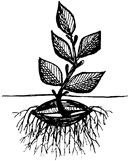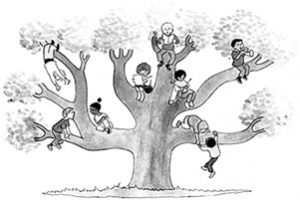Jeremiah 17:5-10, Luke 6:17-26
In the name of God, Father, Son and Holy Spirit
The gospel reading we have just heard, is not the most familiar version of some of these sayings of Jesus. This year we are in Luke’s gospel primarily, and the most familiar version of some of these sayings of Jesus is in Matthew’s gospel. We even have coined a special name for them – the beatitudes. I did some work on these sayings with some year 5 children once, and we described them as “be attitudes”. Attitudes to life that would help us live well! How to be! It did help us to get into them and understand them a bit better, they do contain a level of wisdom but not easy to understand wisdom!
Anyway, Luke’s take on this is all a bit different. In Matthew these sayings are the start of what we describe as the sermon on the mount, and in Luke there is not a mountain in sight! Jesus is also looking and potentially addressing these remarks to the disciples rather than the crowd gathered as a whole. In Matthew we only get statements that started ‘Blessed are’ where as in Luke we get four starting ‘Blessed are’ and then the opposite sense of the statement starting ‘Woe to you’, which are a tougher hear to those living in the relatively affluent parts of the world.
There’s a lot of topsy turvey, inside out and upside down about these statements which reflect an understanding of God’s kingdom and not conventional wisdom. We would not conventionally say for example it is blessed to be hungry or rejected for example. Nor would we say it was a woe to be rich, full or laughing! Jesus’ teaching of the woes indicates there are potential barriers to living a blessed life, if we become too obsessed by what we have and are living too much for ourselves and not for others.
So how do we live a blessed life? The prophet Jeremiah in our reading shows the critical point being trust in the Lord. In fact, not just trust in the Lord but living as those whose trust is the Lord.
Jeremiah started with an illustration of a plant living in an arid place impacted by any adverse conditions that come along, being those who rely on human capacity rather than God’s love for them. This is compared with an illustration of being rooted in the Lord as being like ‘a tree by water’ and able to withstand difficult conditions come what may. We are blessed when we are rooted in Christ, the water of life. This stems from a deep desire to know him and to have him in every part of our lives. It means we surrender and submit to God. God is the one who keeps us settled and grounded.
Are we aware of our roots? What are we rooted in? Where does our trust lie?
 We are often aware of the roots of plants and trees, certainly when we work in our gardens, or when a tree dies or blows over in a storm. Trees and plants often have deep roots that can draw water and nutrients from the soil even in very dry periods. We can rarely see the roots (and often they are as deep and wide below the ground as the tree is above it!) but we know they are there, growing over the years and sustaining the plant’s development. The analogy for us as Christians is clear: we are to be rooted in God, seeking to do God’s will, trusting in God’s power and grace at all times.
We are often aware of the roots of plants and trees, certainly when we work in our gardens, or when a tree dies or blows over in a storm. Trees and plants often have deep roots that can draw water and nutrients from the soil even in very dry periods. We can rarely see the roots (and often they are as deep and wide below the ground as the tree is above it!) but we know they are there, growing over the years and sustaining the plant’s development. The analogy for us as Christians is clear: we are to be rooted in God, seeking to do God’s will, trusting in God’s power and grace at all times.
Jeremiah asks us to be aware of our roots and where our trust lies. He asks us to be cautious about our choices, to suspect our own motives which can be perverse, and to consider the fruit of our doings. For us or for God? This is always a good question. And one that can help us turn back and re-assert our determination to follow God’s will for our lives and not the devices and desires of our own hearts. It is interesting the way Jeremiah describes this with the Lord ‘testing the mind and searching the heart’. There is a sense that God knows us and loves us better than we know and love ourselves. We need to pay attention to the motivations of our hearts. A good test question – is “will this build the kingdom of God?” Things which are self-serving or self-righteous do not stand up well to this testing question.
Going back to the beatitudes in Luke’s working of them. They are also things to make the first disciples and us think. The first and second blessed and the first and second woe statement addresses material wealth and hunger. The danger here is that our personal orientation towards our material goods and bounty limits or warps our orientation towards God. The commentary I read suggested we can be sucked into self-confidence based on what we have, or it just being about how we can enjoy our lives, rather than the walk of discipleship and faith. It is my view that we need to be very careful about money and stuff that it doesn’t become an end in itself. The uncomfortable reality is we live in the part of the world where food is plentiful (yet we still have record numbers of people regularly using food banks and let alone the parts of the world where food is scarce). In many ways the pandemic has shaken some of our confidence in the material stuff of life – But the point Luke is getting to is a different matter – staying confident and reliant on God.
Lent is looming over the horizon, starting on 2nd March and we are approaching a time when generally we pay more attention to our spiritual health as we prepare for Easter. It is definitely time to start thinking about how we might mark Lent this year in our individual walk of discipleship. We may wish to join the Churches Together in Wincanton Lent course – based on the film ‘The Way’. More detail about this is in the newsletter this week.
Coming to worship on Ash Wednesday is also a good starting point. (The Communion Service with optional imposition of ashes is at 7pm on 2nd March in Wincanton). We spend a little longer in this service clearing the decks and repenting of our sins – but it is a helpful fresh start or reset in our walk with God.
I also think an important theme for this Lent is taking time to look at our reliance on God. In our worship during Lent, we are going to explore the statements of the Lord’s prayer week by week (with a bit of a breather for Mothering Sunday). This prayer is something we say day by day, week by week and year by year and is a distillation of our reliance on God and all he has done for us. Maybe we can spend more time week by week during Lent, dwelling in these words for ourselves. If we would value help in doing that, or guidance to material which might help do not hesitate to get in touch.
Whatever we decide to do for Lent, let’s make sure it touches our hearts and their priorities because as I said earlier this is the crux of the matter in our walk of faith. I am going to end with repeating a couple of verses from our Isaiah reading.
 Blessed are those who trust in the Lord, whose trust is the Lord. They shall be like a tree planted by water, sending out its roots by the stream. It shall not fear when heat come, and its leaves shall stay green; in the year of drought it is not anxious, and it does not cease to bear fruit. Amen
Blessed are those who trust in the Lord, whose trust is the Lord. They shall be like a tree planted by water, sending out its roots by the stream. It shall not fear when heat come, and its leaves shall stay green; in the year of drought it is not anxious, and it does not cease to bear fruit. Amen
References:
Some material from © Copyright 2002-2022, ROOTS for Churches Ltd.
The New Revised Standard Version (Anglicized Edition), copyright 1989, 1995
Word Biblical Commentary Luke by John Nolland and Word Biblical Commentary Jeremiah by Peter C Craigie et al.
